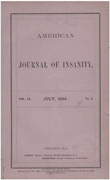Interrater reliability of ratings of delusions and bizarre delusions
Abstract
OBJECTIVE: The authors evaluated the interrater reliability of ratings of bizarre delusions, addressing limitations of previous studies. METHOD: Fifty randomly selected psychiatrists rated bizarre delusions in 30 case vignettes adapted from a previous study by Spitzer and associates. Estimates of reliability were obtained for definitions of bizarre delusions in the DSM-III, DSM-III-R, and draft DSM-IV criteria for schizophrenia and for the clinicians grouped according to their current and previous experience with psychotic patients. RESULTS: The kappas for ratings of bizarre delusions according to the different definitions and among clinicians with different levels of experience were in the moderate to fair range. CONCLUSIONS: The reliability of ratings of bizarre delusions appears to be less than satisfactory for clinical practice, and the increased weight given to this symptom in modern diagnostic systems does not seem justifiable.
Access content
To read the fulltext, please use one of the options below to sign in or purchase access.- Personal login
- Institutional Login
- Sign in via OpenAthens
- Register for access
-
Please login/register if you wish to pair your device and check access availability.
Not a subscriber?
PsychiatryOnline subscription options offer access to the DSM-5 library, books, journals, CME, and patient resources. This all-in-one virtual library provides psychiatrists and mental health professionals with key resources for diagnosis, treatment, research, and professional development.
Need more help? PsychiatryOnline Customer Service may be reached by emailing [email protected] or by calling 800-368-5777 (in the U.S.) or 703-907-7322 (outside the U.S.).



